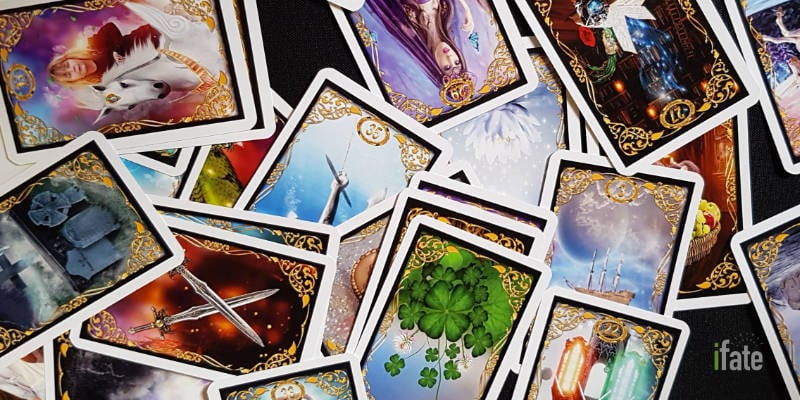Fortune-telling cards: A many splendored thing
Fortune-telling cards have never been more popular. Walk into most good bookstores or esoteric shops, and you’ll see dozens of fortune-telling card options on the shelves.
While most of us are familiar with tarot reading, and perhaps fewer among us are familiar with reading oracle cards, there are actually 5 different categories of fortune-telling cards out there. All of them promise a sneak peak at tomorrow, but they’re all different at a fundamental level.
Have you tried reading your own tarot cards? Try a free online tarot reading now and see how easy it is.
Each of these card types have different deck-structures, and more importantly, different methods of reading the cards. In this article we’ll touch on each of the 5 card types and how they differ.
The 5 types of fortune-telling cards
1. Tarot Cards
Needing little introduction, tarot cards are easily the most famous category in the world of fortune-telling cards. A standard tarot-deck consists of 72 cards, and is divided into two parts: The Minor Arcana and the Major Arcana.
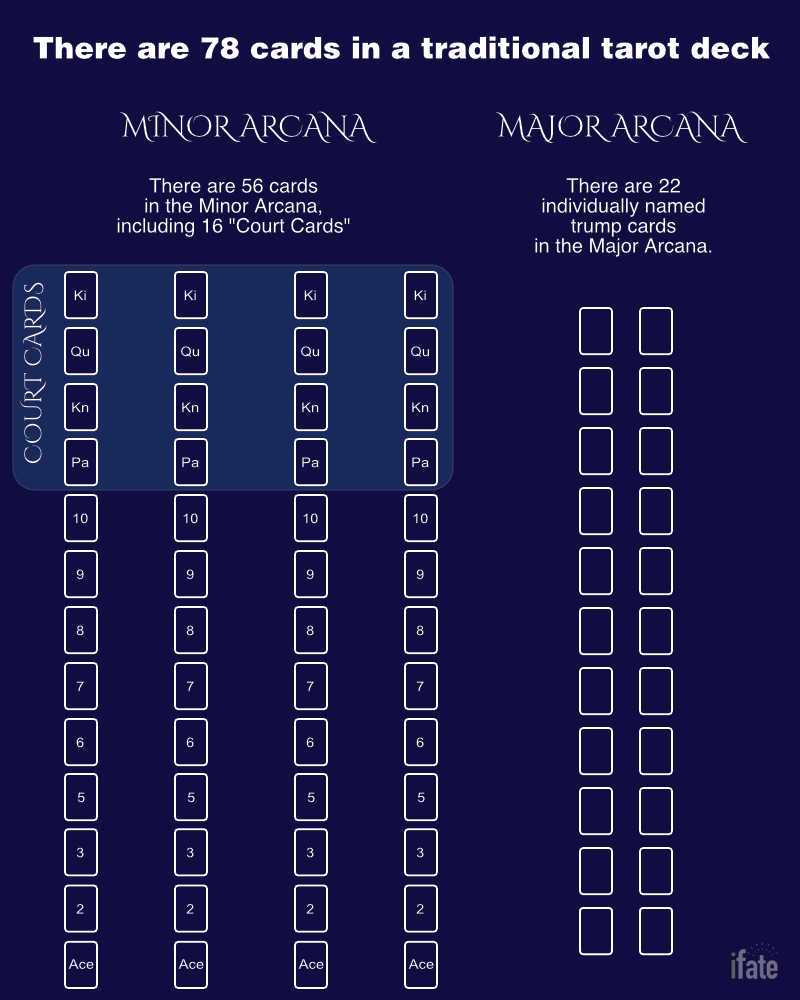
Tarot cards are typically read by creating special layouts called “tarot spreads“, each of which is designed for different types of questions and insights. Simple tarot spreads can have as few as 2, while more complex spreads may consist of 10 or more cards. Tarot cards can also be read one at a time, or used to answer yes or no questions.
2. Marseille Tarot
Like standard tarot cards, Marseille tarot cards (also called Tarot de Marseilles) come in decks of 72 cards, and are similarly split into Minor and a Major divisions. Unlike traditional tarot cards however, the 56 Minor cards are “numbered” and do not have fully illustrated faces. These Minor cards more closely resemble traditional playing-cards.
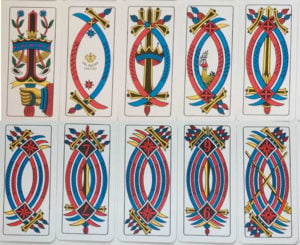
It would be easy to consider Marseille a simple sub-category of regular tarot cards and not an entirely separate category of fortune-telling cards, but there are significant differences which extend beyond the obvious artistic differences. For example: Layouts and spreads of Marseille tarot cards are traditionally read using only the Major cards.
The Minor cards in a Marseille deck are only included in the reading (at the option of the reader), in a manner similar to using clarifying cards in a regular tarot reading.
3. Lenormand Cards
One of the most influential fortune-telling card readers in history was the famous Marie Anne Lenormand. Madame Lenormand’s skill at card reading made her famous throughout Europe during the Napoleonic era. Her clients included such nobles as Empress Josephine (the wife of Napoleon) and the Russian Tsar Alexander I.
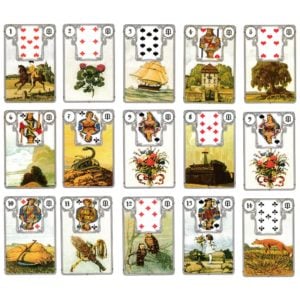
Lenormand was well-known for using her own custom designed deck of cards, known today as the Petit Lenormand or Lenormand cards. These cards are sometimes incorrectly referred to as “Lenormand tarot cards” but they have nothing to do with tarot.
Lenormand’s custom deck of 36 cards feature simplistic illustrations and are read in combinations. In other words, the meaning of each card in a Lenormand reading is influenced by other cards.
4. Oracle Cards
Oracle cards are a very broad category of fortune-telling cards consisting of largely affirmational concepts. Oracle cards can be used both for divination and for personal insight, and many decks are not specifically intended for “fortune-telling” or divination.
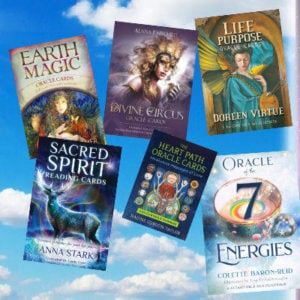
The definition of an oracle card deck is far looser than other types of decks. The number of cards varies widely from deck to deck, as do the card names, meanings and artwork.
A popular sub-category of oracle cards are “Angel cards” which use illustrations of angels on each card to represent various virtuous or affiirmational concepts. Oracle cards can be read in layouts or spreads, similar to tarot cards, or can simply be read individually to answer simple questions.
5. Playing Cards
The last category of fortune-telling cards are simple playing cards. Not specifically intended for use as a divination tool, simple playing cards have been used for fortune telling for centuries. In fact, long before tarot cards were first used for fortune-telling, they were used for a popular card game called tarocchi.
Not specifically intended for use as a divination tool, simple playing cards have been used for fortune telling for centuries.
Throughout history, cartomancers have also used standard playing cards for a variety of reasons. For starters, in the 17 and 1800’s, playing cards were cheaper and far easier to come by than larger and more complex tarot cards. Many inns and taverns featured card games as a form of entertainment. Many a gypsy fortune teller would ply her trade from a table in the corner using a “house” deck of cards.
Today, with easy access to tarot cards, the use of playing cards for fortune-telling has dropped dramatically, although if you’re ever in dire need of a reading and all you have is a deck of standard playing cards, here’s a handy guide to help you read playing cards like tarot cards.
Other types of fortune-telling cards
The creativity of the esoteric scene has produced some interesting cards that blend disciplines and schools of divination. Besides the 5 types of fortune-telling cards listed above, there are some additional categories that deserve mentioning as well:
These hybrid cards include I Ching cards, which replace traditional I Ching readings with card-based systems; Astrology or zodiac fortune-telling cards which blend the worlds of astrology and tarot; And rune cards which blend the worlds of rune magic with a fortune-telling card format.
Are all tarot, oracle and other cards only for fortune-telling?
The term “fortune-telling” in this case is used as a category, and not as a specific use requirement. The broader category is sometimes referred to as “divination cards” or “personal insight cards”.
Whether or not you use cards to ask questions about the future, the past or for self analysis is up to you. See our article about the difference between divination and fortune-telling here.
Ever tried reading tarot cards online? Try a free online tarot reading here and see what it reveals.



